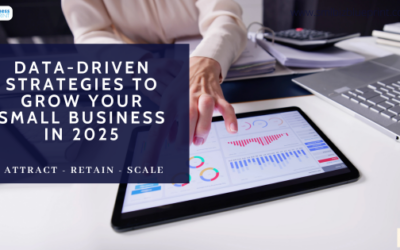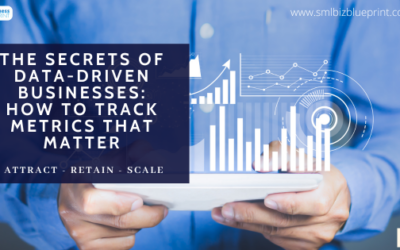Small businesses are the backbone of the economy, and they face unique challenges and opportunities.
One of the key factors that can help small businesses succeed is the power of data analytics.
With the right tools and strategies, small businesses can use data to make informed decisions, improve customer experiences, and grow their bottom line.

What is Data Analytics?
Data analytics is the process of examining data sets to draw conclusions about the information they contain.
It involves using various analytical and statistical techniques to identify patterns, relationships, and trends in the data.
In business, data analytics is used to gain insights into customer behaviour, sales trends, and other key metrics that can inform decision-making.
The Power of Data Analytics for Small Business
Small businesses face many challenges, from limited resources to competition from larger companies.
However, data analytics can give small businesses a competitive edge by helping them to:
#1 Understand Their Customers
By analyzing customer data, small businesses can gain insights into what their customers want and need.
This information can be used to improve products and services, personalize marketing messages, and build stronger relationships with customers.
Clarity is essential when it comes to analyzing customer data, as this type of data can give a business clear insights into the behaviour and actions of its customers.
Businesses can effectively communicate insights from customer data to stakeholders and decision-makers.
One small business that has leveraged data analytics to better understand its customers is a restaurant chain called TGI Fridays. By analyzing data on their customers’ dining habits and preferences, TGI Fridays were able to develop a new menu that catered to their customers’ tastes. This helped the chain to increase sales and attract new customers.
#2 Make Informed Decisions
Data analytics can help small business owners make more informed decisions by providing them with accurate and up-to-date information about their operations.
This can include everything from sales data to inventory levels to employee performance.
This type of data allows business owners to be better informed about the strength of their business and to improve their decision-making because of these insights.
Another small business that has successfully used data analytics to make informed decisions is a retail store called Rebecca Minkoff. By analyzing sales data and customer feedback, Rebecca Minkoff was able to identify which products were most popular and which were not selling well. This helped the store to make better purchasing decisions and improve its overall sales performance.
#3 Improve Efficiency
By analyzing data about their operations, small businesses can identify areas where they can improve efficiency and reduce costs.
This can help them to operate more effectively and compete more effectively with larger companies.
This allows business owners to effectively communicate insights from operational data to stakeholders and decision-makers.
A small business that has improved efficiency through data analytics is a construction company called AECOM. By analyzing data on project timelines, resource allocation, and employee performance, AECOM was able to identify areas where they could streamline their operations and reduce costs. This helped the company to operate more efficiently and increase its profitability.

#4 Identify New Opportunities
Data analytics can help small businesses identify new opportunities for growth and expansion.
By analyzing market trends and consumer behaviour, small businesses can identify areas where there is unmet demand and develop new products or services to meet that demand.
This can help small businesses effectively communicate insights from market trends and consumer behaviour analysis.
One small business that has identified new opportunities through data analytics is a software company called Slack. By analyzing market trends and user behaviour, Slack was able to identify a gap in the market for a messaging platform that could improve team collaboration. This led to the development of their successful messaging app, which has since become a widely-used tool for businesses around the world.
#5 Stay Ahead of the Competition
In today’s highly competitive business environment, staying ahead is essential for small businesses to survive and thrive.
One of the critical advantages of data analytics is that it can help small businesses to monitor the competition and adjust their strategies as needed.
By analyzing data on competitors’ products, pricing, marketing campaigns, and other key metrics, small businesses can gain insights into what works and what doesn’t in their industry.
This can help them to make more informed decisions and stay ahead of the curve.
A small business that has successfully stayed ahead of the competition through data analytics is a transportation company called Lyft. By analyzing data on customer behaviour and preferences, as well as competitor pricing and promotions, Lyft was able to adjust its own pricing and promotions to better compete with its rivals. This helped the company to increase its market share and win more business.
These examples demonstrate how data analytics can be used to achieve various business objectives, including understanding customers, making informed decisions, improving efficiency, identifying new opportunities, and staying ahead of the competition.
By leveraging the power of data analytics, small businesses can achieve their goals and drive growth in today’s competitive business environment.

#6 Tools and Strategies for Data Analytics in Small Business
Small businesses don’t need to invest in expensive software or hardware to take advantage of data analytics.
There are many affordable and easy-to-use tools available that can help small businesses to gather and analyze data.
Some of the most popular tools and strategies for data analytics in small businesses include:
Customer Relationship Management (CRM) software:
CRM software allows small businesses to track and manage customer interactions, including sales, marketing campaigns, and customer service inquiries.
By analyzing this data, small businesses can gain insights into customer behaviour and preferences.
This allows decisions to be made on what is actually happening, not what you think is happening.
Social media analytics:
Small businesses can use social media analytics tools to track engagement, monitor sentiment, and identify trends on social media platforms.
This information can be used to improve marketing campaigns and build stronger relationships with customers.
Social media analytics gives you results in real time and allows a business owner to test a variety of new ideas, products, and campaigns without having to spend a large amount of money or wait for a long period of time.
Website analytics:
Small businesses can use website analytics tools like Google Analytics to track website traffic, user behaviour, and conversion rates.
This information can be used to optimize website performance and improve user experience.
This allows business owners to make quick decisions on how to improve their website to dramatically improve conversions, whether they be capturing more leads, improving sales or following up with customers.
Data visualization:
Data visualization tools like charts and graphs can help small businesses to make sense of complex data sets and identify patterns and trends more easily.
This can help small business owners to make informed decisions quickly and efficiently.
Sometimes it is easier to communicate a message with graphics and charts. This will allow various stakeholders to gain a better and deeper understanding of how customers are acting.
Data-driven decision-making:
To get the most out of data analytics, small businesses need to embrace a data-driven decision-making culture.
This means using data to inform decisions at every level of the organization, from product development to marketing to customer service.
Data analytics can be a powerful tool for small businesses.
By using data to gain insights into customer behaviour, sales trends, and other key metrics, small businesses can make informed decisions, improve customer experiences, and grow their bottom line.
With the right tools and strategies, small businesses can leverage the power of data analytics to compete more effectively with larger companies and win more business.
Conclusion
As the business landscape continues to evolve, data analytics will become an increasingly important tool for small businesses looking to compete and grow.
By embracing data-driven decision-making, using the right tools and strategies, and taking into account concepts like perplexity and burstiness, small businesses can gain a competitive edge and achieve their goals.
In conclusion, the power of data analytics for small businesses cannot be overstated.
By analyzing data from various sources, small businesses can gain valuable insights that can help them make informed decisions, improve their operations, and grow their business.
With the right tools, strategies, and communication methods, small businesses can take full advantage of the power of data analytics to achieve their goals and thrive in today’s competitive business environment.




